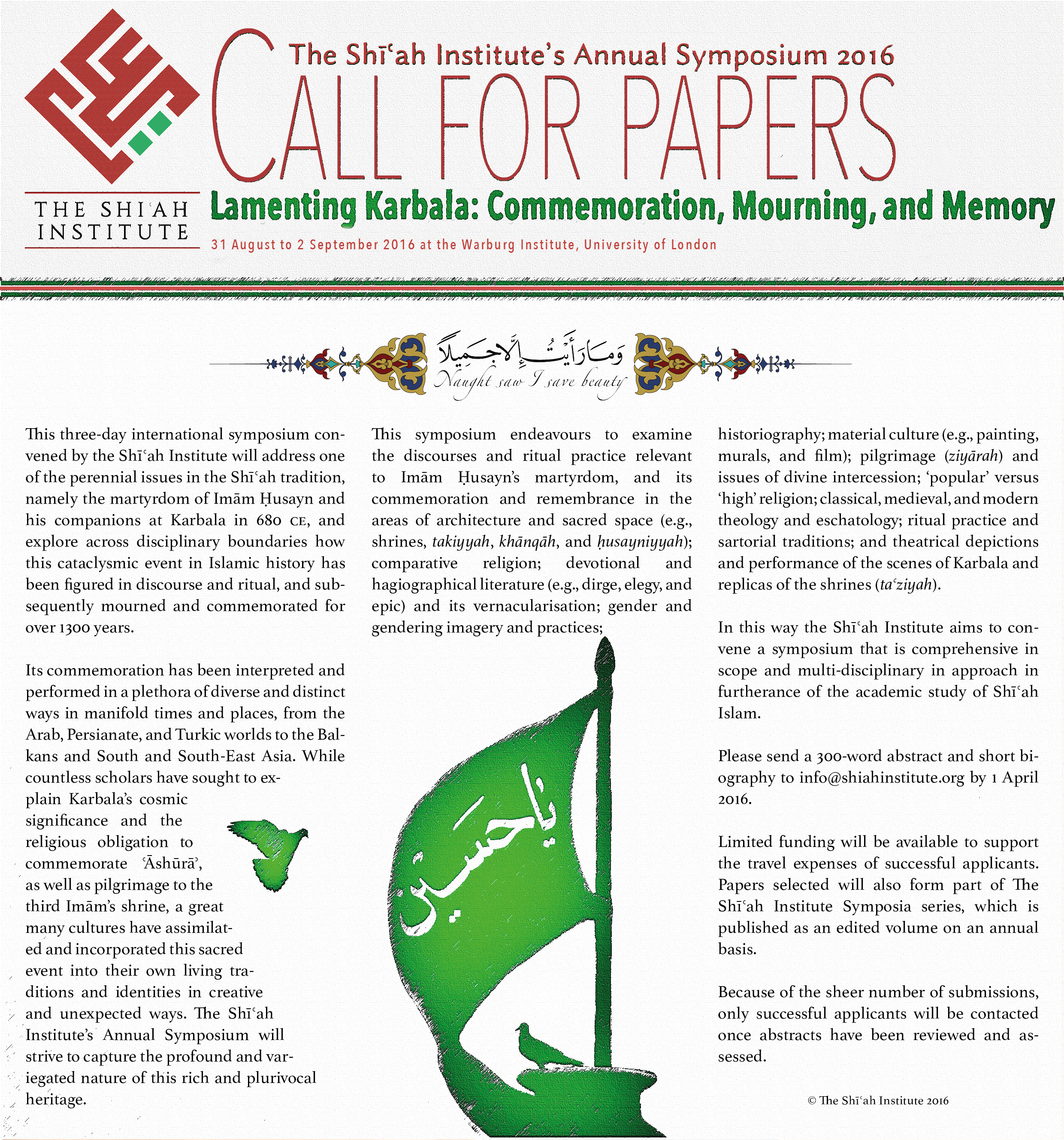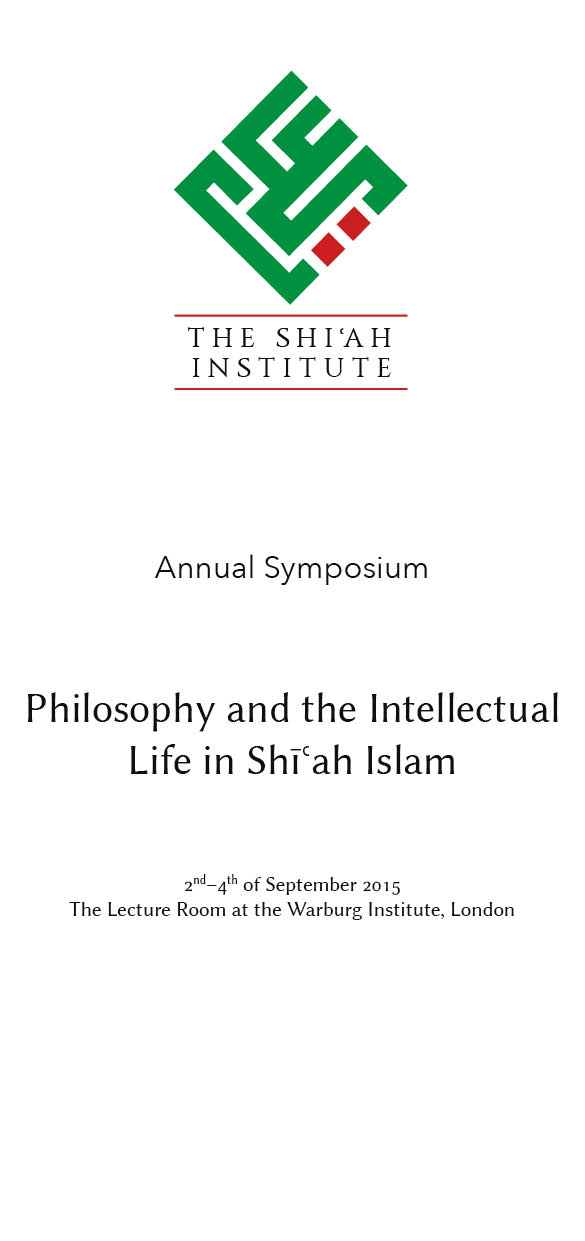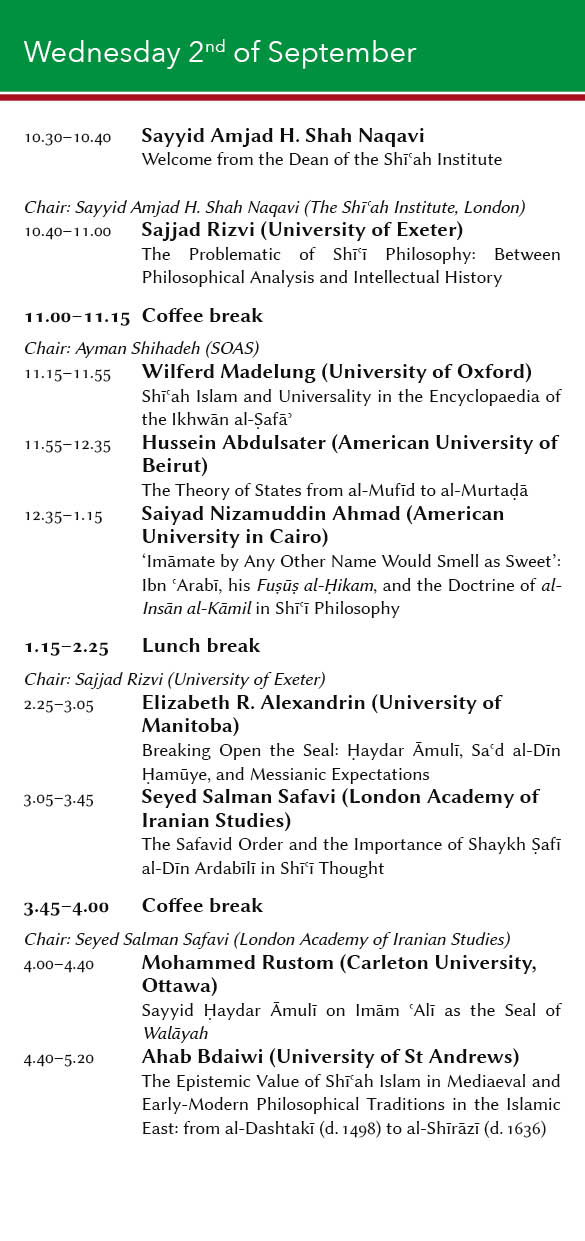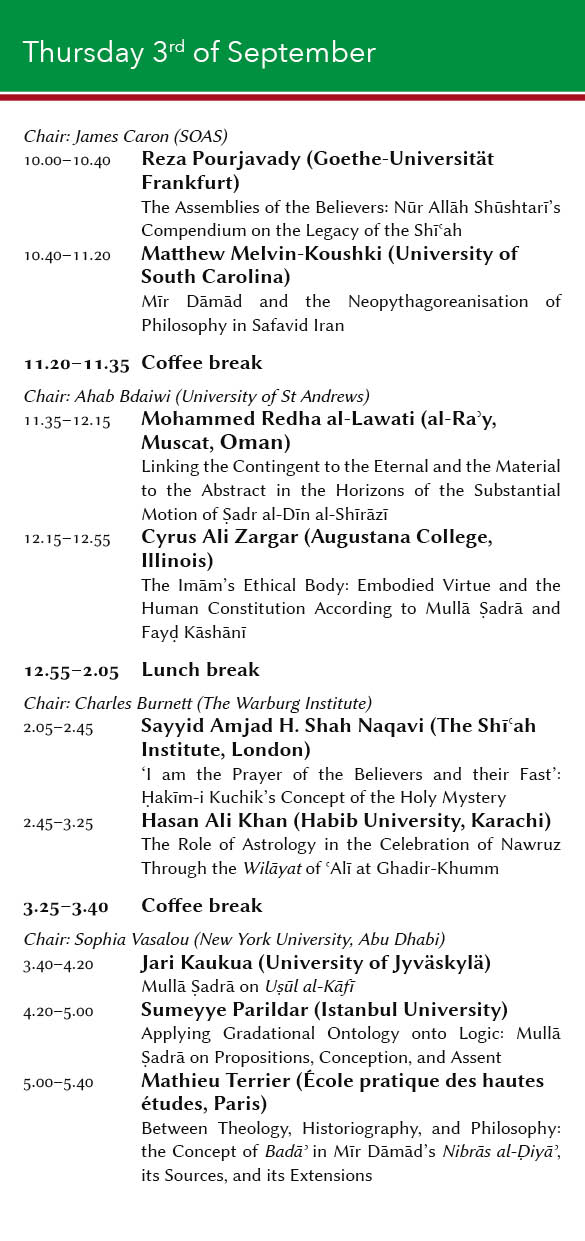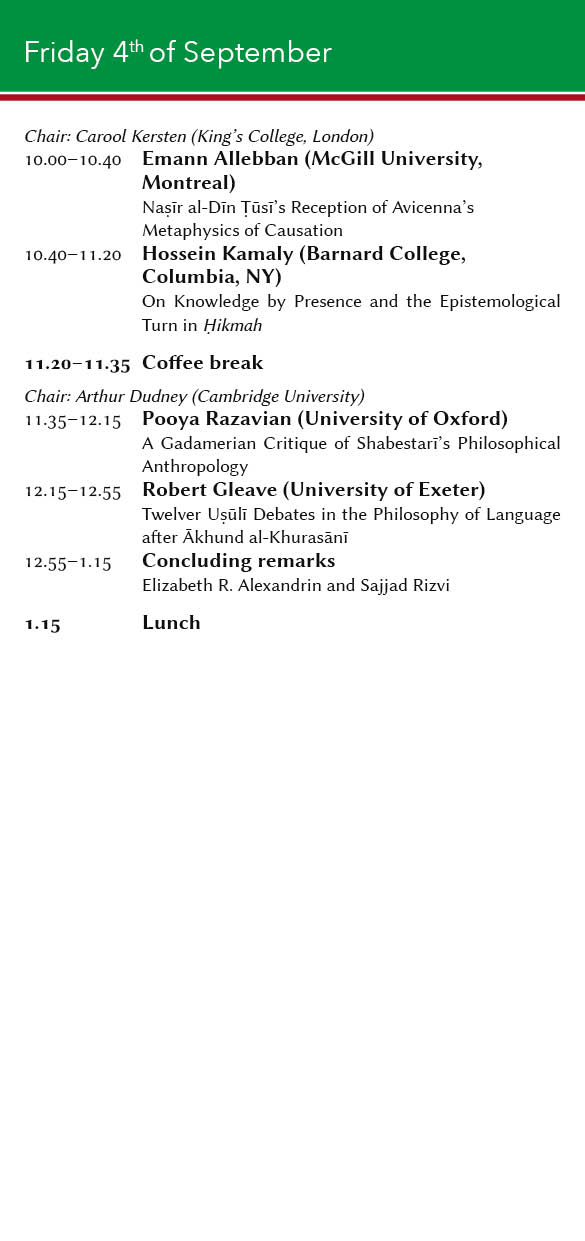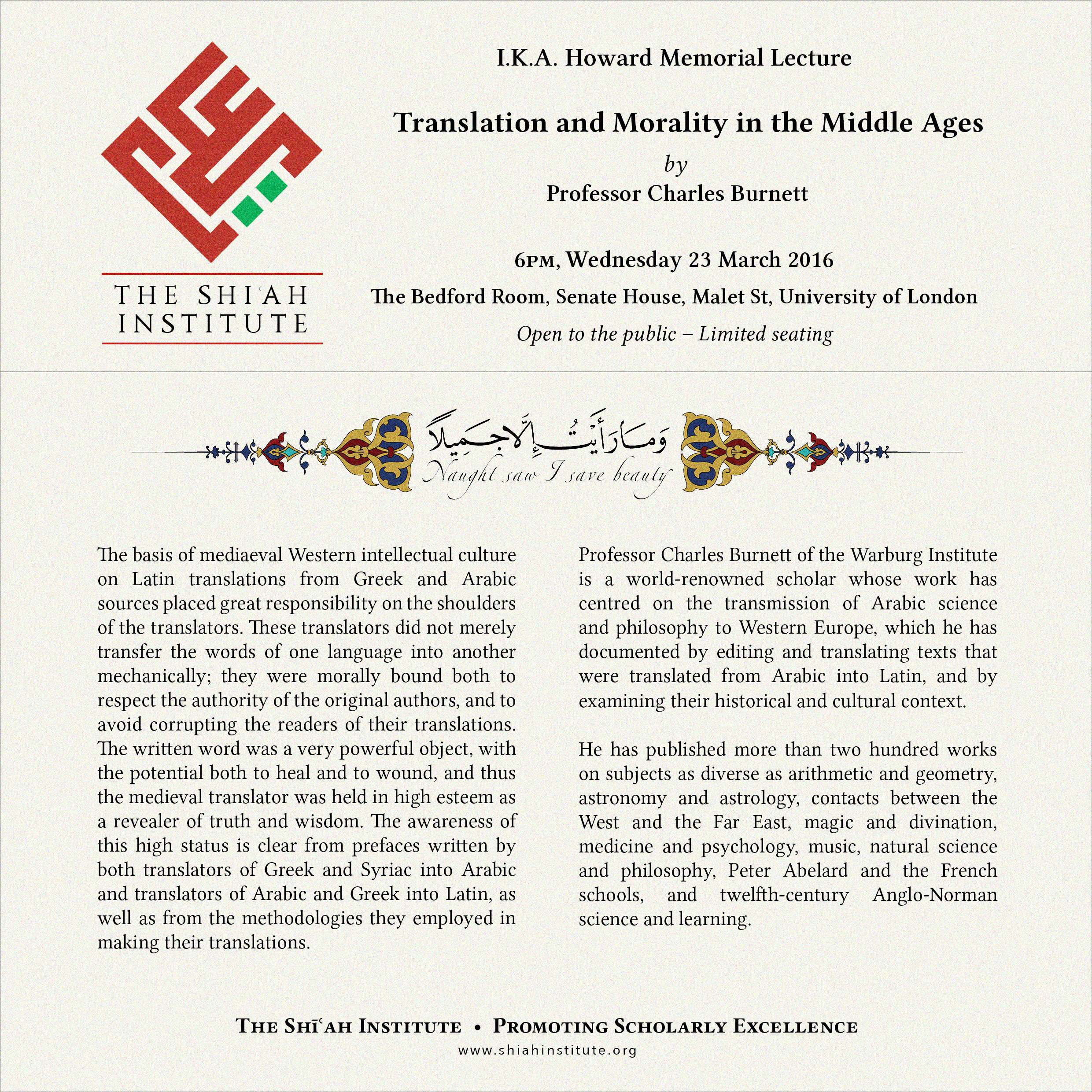
—-
Lamenting Karbala: Commemoration, Mourning, and Memory
31 August–2 September 2016, The Warburg Institute, University of London
This three day international symposium convened by the Shīʿah Institute will address one of the perennial issues in the Shīʿah tradition, namely the martyrdom of Imām Ḥusayn and his companions at Karbala in 680 AD, and explore across disciplinary boundaries how this cataclysmic event in Islamic history has been figured in discourse and ritual, and subsequently mourned and commemorated for over 1300 years.
Its commemoration has been interpreted and performed in a plethora of diverse and distinct ways in manifold times and places, from Iraq, Iran, and the Levant, to Central and South Asia and the Arabian Peninsula, and far beyond. While countless scholars have sought to explain Karbala’s cosmic significance and the religious obligation to commemorate ʿĀshūrāh, as well as pilgrimage to the third Imām’s shrine, a great many cultures have assimilated and incorporated this sacred event into their own living traditions and identities in creative and unexpected ways. The Shīʿah Institute’s Annual Symposium will strive to capture the profound and variegated nature of this rich and plurivocal heritage.
This symposium endeavours to examine the discourses and ritual practice relevant to Imām Ḥusayn’s martyrdom, its commemoration and remembrance in the areas of classical, medieval, and modern theology and eschatology; comparative religion; ‘popular’ versus ‘high’ religion; historiography; devotional and hagiographical literature (dirge, epic, poetry, elegy) and its vernacularisation; theatrical depictions and performance of the scenes of Karbala in Iran and Iraq and replicas of the shrines in South Asia (taʿziyah); ritual practice and sartorial traditions; pilgrimage (ziyārah) and issues of divine intercession; architecture, and sacred space (shrines, takiyyah, ḥusayniyyah); gender and gendering imagery and practices; murals; painting; film; and questions of material culture more broadly. In this way the Shīʿah Institute aims to convene a symposium that is comprehensive in scope and multi-disciplinary in approach in furtherance of the academic study of Shīʿah Islam.
Please send a 300 word abstract and short biography to [email protected] by 1 April 2016.
Limited funding will be available to support the travel expenses of successful applicants. Papers selected will also form part of the Shīʿah Institute’s symposia series, which is published as an edited volume on an annual basis.
Because of the sheer number of submissions, only successful applicants will be contacted once abstracts have been reviewed and assessed.
On the 9th of October 2015, the Shīʿah Institute held the book launch for The Mystery of Prayer by Ayatollah Ruhollah Khomeini in Macmillan Hall at Senate House, University of London. At the event, Riyaz Dhalla gave his reflections on the life and thought of Ayatullah Khomeini, Sayyid Ali Kazimi spoke on the importance of The Mystery of Prayer, and the Dean of the Shīʿah Institute, Sayyid Amjad H. Shah Naqavi discussed the challenges and theories involved in authentically translating the work. The event commenced at 6.30 pm and concluded at 9 pm with a food and beverage reception. The Shīʿah Institute would like to thank all our guests for their attendance and our speakers for their talks.
The Mystery of Prayer by Ayatollah Ruhollah Khomeini, completed in June 1939, represents the author’s most original contribution to modern Shīʿī philosophy (ḥikmah) and gnosticism (ʿirfān), a work that draws upon scriptural sources and the Shīʿah intellectual and mystical traditions to engage with the understanding of the higher pursuits of mankind’s reconnection with God. Taking the ritual of prayer as a vehicle for comprehending the nature of reality as a reflection, manifestation, and determination of the divine, The Mystery of Prayer elucidates upon the esoteric dimensions of each stage of the ritual prayer as the wayfarer ascends through degrees and theophanies to arrive in the presence of God.
The first work in the Modern Shīʿah Library, published in June 2015 in partnership with Brill, Sayyid Amjad H. Shah Naqavi’s English translation includes extensive explanatory footnotes and a twenty-eight-page introduction that explores the sources, influences, and development of Khomeini’s gnostic concepts and taxonomies in his intellectual milieu.
On the 2nd to the 4th of September 2015, the Shīʿah Institute held its first Annual Symposium at the Warburg Institute, University of London. This year’s Annual Symposium was themed around the subject of ‘Philosophy and the Intellectual Life in Shīʿah Islam’.
The Dean of the Shīʿah Institute, Sayyid Amjad H. Shah Naqavi, delivers a welcome note to those convened for the Shīʿah Institute’s Annual Symposium 2015
A look at the papers presented as part of the Shīʿah Institute’s Annual Symposium 2015 on ‘Philosophy and the Intellectual Life in Shīʿah Islam’
The following papers were delivered at this year’s Annual Symposium:
- Sajjad Rizvi (University of Exeter) – The Problematic of Shīʿī Philosophy: Between Philosophical Analysis and Intellectual History
- Wilferd Madelung (University of Oxford) – Shīʿah Islam and Universality in the Encyclopaedia of the Ikhwān al-Ṣafāʾ
- Hussein Abdulsater (American University of Beirut) – The Theory of States from al-Mufīd to al-Murtaḍā
- Saiyad Nizamuddin Ahmad (American University in Cairo) – ‘Imāmate by Any Other Name would Smell as Sweet’: Ibn ʿArabī, his Fuṣūṣ al-Ḥikam, and the Doctrine of al-Insān al-Kāmil in Shīʿī Philosophy
- Elizabeth R. Alexandrin (University of Manitoba) – Breaking Open the Seal: Ḥaydar Āmulī, Saʿd al-Dīn Ḥamūye, and Messianic Expectations
- Seyed Salman Safavi (London Academy of Iranian Studies) – The Safavid Order and the Importance of Shaykh Ṣafī al-Dīn Ardabīlī in Shīʿī Thought
- Mohammed Rustom (Carleton University, Ottawa) – Ḥaydar Āmulī on Imām ʿAlī as the Seal of Walāyah
- Ahab Bdaiwi (University of St Andrews) – The Epistemic Value of Shīʿah Islam in Mediaeval and Early-Modern Philosophical Traditions in the Islamic East: from al-Dashtakī (d. 1498) to al-Shīrāzī (d. 1636)
- Reza Pourjavady (Goethe-Universität Frankfurt) – The Assemblies of the Believers: Nūr Allāh Shūshtarī’s Compendium on the Legacy of the Shīʿah
- Matthew Melvin-Koushki (University of South Carolina) – Mīr Dāmād and the Neopythagoreanisation of Philosophy in Safavid Iran
- Mohammed Redha al-Lawati (al-Raʾy, Muscat, Oman) – Linking the Contingent to the Eternal and the Material to the Abstract in the Horizons of the Substantial Motion of Ṣadr al-Dīn al-Shīrāzī
- Cyrus Ali Zargar (Augustana College, Illinois) – The Imām’s Ethical Body: Embodied Virtue and the Human Constitution according to Mullā Ṣadrā and Fayḍ Kāshānī
- Sayyid Amjad H. Shah Naqavi (The Shīʿah Institute, London) – ‘I am the Prayer of the Believers and their Fast’: Ḥakīm-i Kuchik’s Concept of the Holy Mystery
- Hasan Ali Khan (Habib University, Karachi) – The Role of Astrology in the Celebration of Nawruz Through the Wilāyat of ʿAlī at Ghadir-Khumm
- Jari Kaukua (University of Jyväskylä) – Mullā Ṣadrā on the Uṣūl al-Kāfī
- Sumeyye Parildar (Istanbul University) – Applying Gradational Ontology onto Logic: Mullā Ṣadrā on Propositions, Conception, and Assent
- Mathieu Terrier (École pratique des hautes études, Paris) – Between Theology, Historiography, and Philosophy: The Concept of Badāʾ in Mīr Dāmād’s Nibrās al-Ḍiyāʾ, its Sources, and its Extensions
- Emann Allebban (McGill University, Montreal) – Naṣīr al-Dīn al-Ṭūsī’s Reception of Avicenna’s Metaphysics of Causation
- Hossein Kamaly (Barnard College, Columbia, NY) – On Knowledge by Presence and the Epistemological Turn in Ḥikmah
- Pooya Razavian (University of Oxford) – A Gadamerian Critique of Shabestarī’s Philosophical Anthropology
- Robert Gleave (University of Exeter) – Twelver Uṣūlī Debates in the Philosophy of Language after Ākhund al-Khurasānī
The Shīʿah Institute 2015 Annual Symposium Programme
The Shīʿah Institute is proud to announce its partnership with the School of Oriental and African Studies (SOAS), University of London in providing financial support for a new module in the department of the Study of Religions entitled ‘Shi‘a Islam: Religious Authority and Community Identity’. This module, available from the commencement of the 2015–2016 academic year, will introduce undergraduate students to the origins, developments, and historical manifestations of Shīʿah Islam, as well as exploring the contemporary outlook of Shīʿah Muslim communities across the world.
Dr Sayyid Amjad H. Shah Naqavi, Dean of the Shīʿah Institute attended a ceremony on Monday 29 June 2015 to sign the partnership agreement between SOAS and the Shīʿah Institute.
Head of the Department of the Study of Religions, Dr Erica Hunter said: ‘I am thrilled that this new course on Shīʿah Islam will be offered within the Department. The course will enable students to broaden their appreciation and understanding of Islam and explore the considerable important and rich contributions that Shīʿism has made over the centuries to this world religion.’
Sayyid Amjad H. Shah Naqavi, Dean of the Shīʿah Institute, said: ‘We are delighted and honoured to be in partnership with SOAS in offering this module. The Shīʿah Institute believes that there is no greater nurturer of knowledge and empathy in people than a good higher education in the humanities. If our ignorance is our only enemy, then teaching and learning have a unique role in dispelling that ignorance and nurturing a more harmonious world.’
For more information on our partnership, visit the SOAS website.
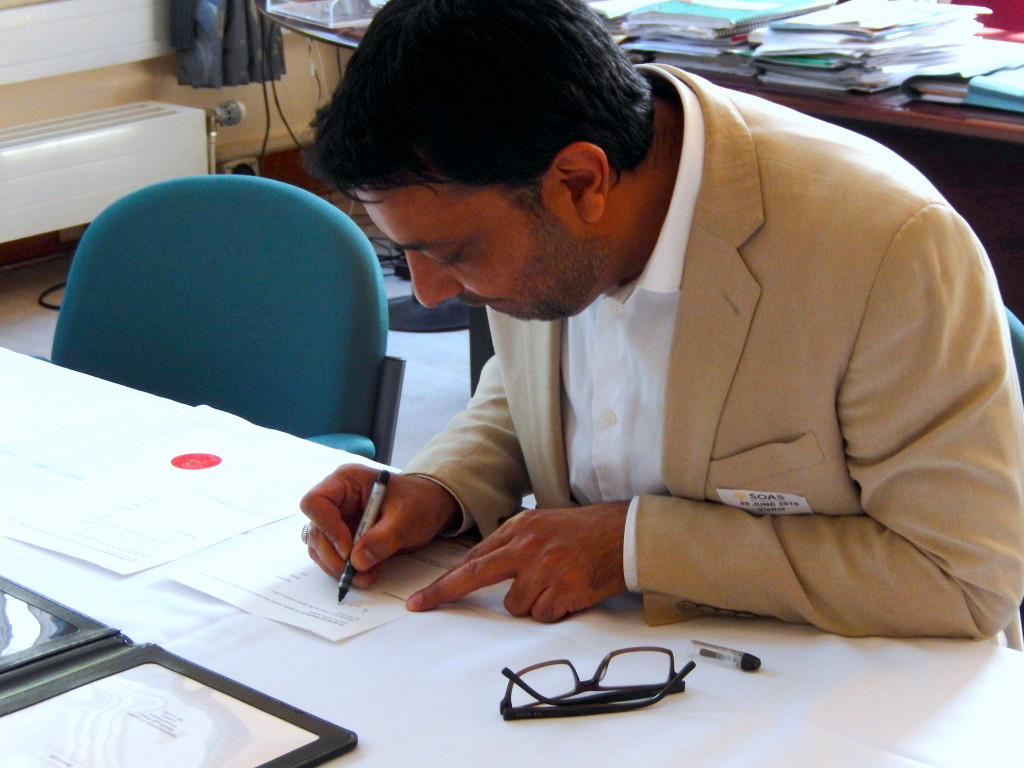
The Shīʿah Institute, in partnership with Brill, is delighted to announce the first volume in the Modern Shīʿah Library series, The Mystery of Prayer.
The Shīʿah Institute will be convening its first annual symposium at the Warburg Institute, University of London from Wednesday the 2nd to Friday the 4th of September 2015.
The theme for the first symposium will be Philosophy in/and Shīʿah Islam and will comprise a series of papers that will provide theoretical reflections on the relationship between philosophy, modes of philosophical reasoning, living, and Shīʿah Ithnā ʿAsharī traditions, as well as studies of particular thinkers, texts, and schools of thought throughout Shīʿah history. We plan to publish the papers presented at each symposium in an annual volume organised around that year’s theme.
The full programme for the Symposium will be available shortly, but in the interim we are pleased to announce that the following of our fellows and scholars in the field will be amongst those presenting at the symposium:
Hussein Abdulsater (American University of Beirut)
Saiyad Nizamuddin Ahmad (American University of Cairo)
Elizabeth R Alexandrin (University of Manitoba)
Emann Allebban (McGill University, Montreal)
Ahab Bdaiwi (University of St Andrews)
Alessandro Cancian (Institute of Ismaili Studies)
Robert Gleave (University of Exeter)
Hossein Kamaly (Barnard College, Columbia, New York)
Jari Kaukua (University of Jyväskylä)
Hasan Ali Khan (Habib University, Karachi)
Mohammed Redha Lawati (al-Ray, Muscat, Oman)
Wilferd Madelung (Oxford University)
Matthew Melvin-Koushki (University of South Carolina)
Nauman Naqvi (Habib University, Karachi)
Reza Pourjavady (Goethe-Universität, Frankfurt)
Pooya Razavian (Oxford University)
Mohammed Rustom (Carleton University, Ottawa)
Mathieu Terrier (École Pratique des Hautes Études, Paris)
Cyrus Ali Zargar (Augustana College, Illinois)
If you are interested in attending—and participation is by invitation only—please contact Benjamin Wakefield ([email protected]).
Book launch video of Jawn Martyr of Karbala Lamented
On the 14th of November 2014, the Shīʿah Institute had the honour of commemorating the Lords of Karbala and contributing 1,104 verses of poetry to the Urdu literary canon with the launch of Marsiyah dar hal Janab Jawn ibn Hawiyy mawla Abi Dharr al-Ghifari; or, Jawn Martyr of Karbala Lamented by His Highness Raja Mohammad Amir Ahmad Khan (1914-1973). This work marks the Shīʿah Institute’s first publication, and the first volume in The Shīʿah Heritage of South Asia series.

